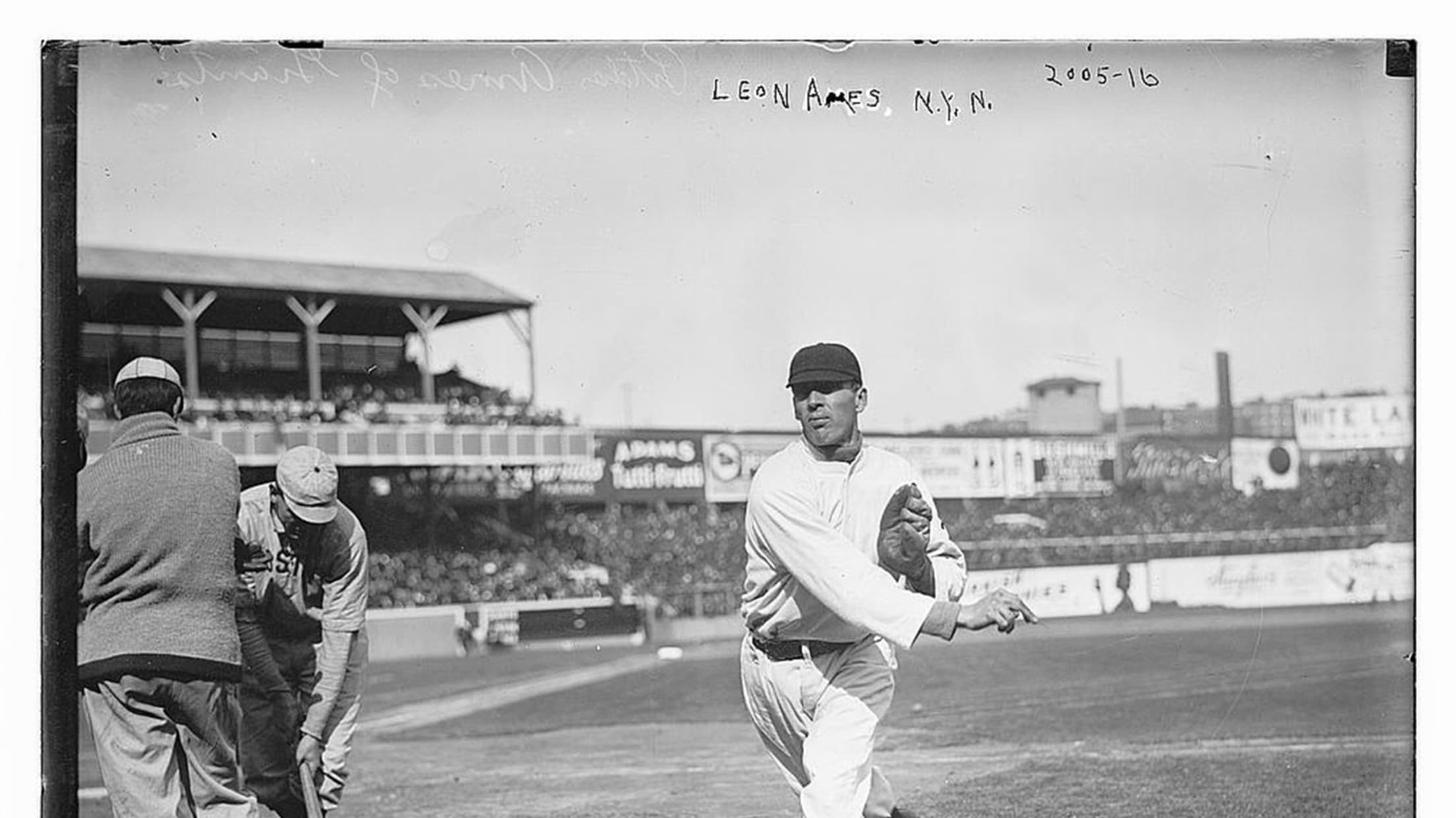Here is the story of old-time pitcher Red Ames and his lucky, 'jinx-destroying' necktie

Who holds the MLB record for most wild pitches in a single season? Unless you already know the answer, you surely are imagining either a knuckleballer or a famous wild fireballer, like Ryne Duren or a young Randy Johnson. You would be wrong.
The record belongs to Leon "Red" Ames, who tossed 30 wild ones with the New York Giants in 1905.
Newspaper accounts certainly weren't shy about reporting on his wildness, with The Sun saying Ames "slammed in a horribly wild pitch" during one start in 1905:
It may explain why his catcher, future Hall of Famer Roger Bresnahan, was one of the first to develop catcher's shinguards.
Armed with a strong curveball (which may explain some of those wild pitches), Ames had a solid Major League career. He won 22 games in that wild 1905 -- collecting a World Series ring that year, too -- and finished with a career 2.63 ERA in 3,198 innings. Though he pitched during a depressed offensive environment, his career ERA ranks just behind Tim Keefe, Cy Young and Vic Willis -- all Hall of Famers.
With that resume, it's strange that he holds the wild pitch record. Though he led the league again with 20 in 1907, his career average was just 12 per season. But, see, that's the other thing about Ames. He had such terrible luck he received a second nickname, "Kalamity." He was even referred to as the "unlucky Ohioan" in this Washington Herald column from 1911:
Despite all the positives, Ames is most known for his Harvey Haddix-like loss in a no-hitter. Only his came 50 years before the hard-luck Pirate.
On Opening Day in 1909, Ames held the Brooklyn Superbas hitless through nine innings. Only problem? He was going up against Kaiser Wilhelm, who was nearly as dominant as he held the Giants to one hit. Ames would lose the no-no in the 10th before giving up three runs in the 13th to take the loss.
It became a bit of a pattern. Next season would open the same way, as Ames no-hit Boston into the seventh, holding the lead into the ninth. The Giants would lose in 11 innings.
It happened in 1911, too, when Ames no-hit Philadelphia for six innings and still took the "L."
Ames' teammate Christy Mathewson wrote that he may hold the "marathon record for being the most unlucky pitcher that ever lived."
It got so bad that Ames wanted to skip the final road trip with the Giants in 1911, assuming he would be of no use to the team. Instead, Ames traveled with the club and received a package from what Mathewson termed a "prominent actress." Inside was a four-leaf clover and a necktie, with directions instructing Ames that he must wear them with his uniform and his street clothes if he wanted the charms to work.
"You've got a lot of work cut out for you, old boy," Ames reportedly said to the objects, "but I'd wear you if you were a horseshoe."
Sure enough, Ames would beat Boston that night, 4-1, and announced at dinner that he would not stop wearing the tie until he lost. The Giants went on a hot streak -- going 19-4 on the road trip -- with Ames winning in each of his starts. Once he was removed in a game in the sixth inning, only for his team to bail him out and deliver him the "W."
Ames wore that necktie everywhere he went, the cloth growing more and more tattered over time. But still, he wore it. He lost once more right before the end of the season, but Ames exonerated the necktie by blaming the loss on manager John McGraw and some rookies that didn't help out.
Unfortunately for Ames, his necktie -- and his team's -- luck eventually ran out. The Giants lost the World Series in six games to the Philadelphia A's, with Ames taking the loss in the final game of the series.
Though the necktie's powers seemed to wane, Mathewson wrote that Ames took the necktie to his home in Warren, Ohio, and put it in a cabinet for safekeeping, so he could "trot out the 'jinx' destroyer next season."
If he did, it worked. Ames went 11-5, and the Giants once again won the NL pennant. Unfortunately, the Giants again lost the World Series, dropping in eight games (Game 2 was called at a 6-6 tie after 11 innings), though Ames didn't take the "L" this time around.
Maybe it really was a magic necktie, but just like the heavenly helpers in "Angels in the Outfield," it refused to help out in the World Series.









